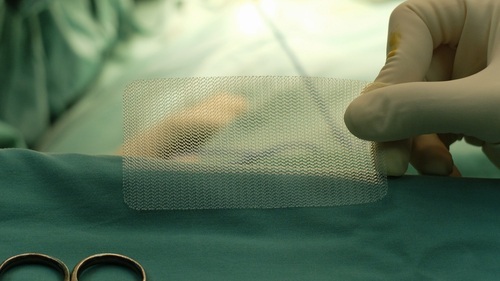Chronic pain may result after a doctor has performed a hernia surgery if he or she used a hernia mesh to repair your injury. These products can be extremely dangerous and often manufacturers downplay their risks when convincing doctors to use their particular product.
Chronic pain is long-lasting, causing you to suffer for months or years. Likely, one of the reasons you sought to repair your hernia was to escape the sometimes incredible discomfort it can cause. If your suffering simply will not go away as the result of a hernia surgery, you may be able to file a lawsuit for compensatory damages.
Our personal injury attorneys are here to inform you about these issues and answer some of your questions, such as:
- 1. What is chronic pain?
- 1.1 What is acute pain?
- 1.2 How can this pain affect me?
- 2. How severe can it be?
- 3. What causes chronic pain?
- 3.1 How can a hernia mesh cause agony?
- 3.2 Is it my doctor’s fault?
- 4. How can the pain be treated?
- 5. When should I contact a personal injury attorney?

1. What is chronic pain?
Chronic pain is commonly defined as the presence of pain, hypersensitivity, or discomfort which was not present before surgery and has existed for at least 3 months following the surgery. While the pain must last past three months to be considered chronic generally speaking, it can last substantially longer.
Pain can linger for years, or even for the rest of your life if left untreated. When that pain is the result of defective hernia mesh or a doctor’s mistake, you may be entitled to bring a personal injury lawsuit to sue for damages.
1.1 What is acute pain?
Acute pain is that which occurs immediately and soon after your hernia mesh surgery. The pain can last anywhere from 2-14 days, or even several weeks.
Severe groin pain immediately after surgery is cause for alarm. You should consult your surgeon immediately, as this can be the result of irritation from surgical material left in the body or an improperly placed mesh. 1
1.2 How can this pain affect me?
Both types of pain can significantly affect your well-being and your ability to function in your everyday life. It may:
- Limit your physical functionality in daily tasks
- Prevent your ability to work
- Cause loss of energy and fatigue
- Prevent you from spending time with loved ones
- Cause mental health issues such as depression.
2. How severe can it be?
Pain can range in severity from mild to excruciating and anything in between. As anyone who has lived with chronic pain can tell you, even mild to moderate pain can feel debilitating when it will not stop.
A woman named Leila Hackett had an umbilical hernia mesh repair performed in 2013. She said, “Straightaway I could feel the mesh.” She also described the pain, saying “It started off like fiery burning agony but it never stopped hurting or itching.”
She later learned that the hernia mesh material had become attached to her internal organs, which caused her bowel to twist. Her pain and experiences are shared by many patients who have suffered the same thing. 2
3. What causes chronic pain?
In most hernia repairs, incisions are made into your body to repair the damage. The body naturally reacts with discomfort to the cuts and movement of its pieces associated with surgery. Lingering pain may also result from your original hernia until it fully heals.
However, it can also be the fault of a defective hernia mesh or a doctor’s negligence.
3.1 How can hernia mesh cause the agony?
There are two main causes of pain following a hernia repair surgery:
- Reaction to the hernia mesh: The mesh itself can cause severe inflammation and swelling of the surrounding area, which leads to pain. The body may recognize the mesh as a foreign object and attempt to “attack” it. Also, the mesh may rub up against nerves and muscles, causing irritation.
- Disturbance of surrounding nerves: There are important nerves which run through the typical surgery area, and they can be disturbed because of the mesh or a doctor’s improper surgical technique. 3
3.2 Is it my doctor’s fault?
The answer to this question can be complicated, but the answer is: “sometimes.” If the hernia mesh installed is defective without the doctor’s knowledge, it may not be his or her fault that you now suffer from chronic pain. Instead, the fault lies with the manufacturer of the mesh.
In some cases, however, a doctor may fail to properly perform your surgery repair. This can occur as a result of:
- Accidental cutting of nerves
- Improper displacement of bodily tissue
- Failure to properly install the hernia mesh
- The doctor leaving surgical materials in your body (for example, gauze or sponges).
4. How can the pain be treated?
If you are suffering from chronic pain after a hernia mesh surgery, it is time to talk to a doctor. While acute pain can be treated with medications, chronic pain often requires more direct action, such as:
- Removal of Mesh: Surgical procedure which removes the defective mesh
- PRP Injections: The doctor injects a plasma rich protein mix which promotes healing and eases nerve pain
- Neurectomy: Surgical procedure which removes a nerve or part of a nerve
- Nerve Ablation: A less invasive medical procedure which uses electric currents to lessen nerve pain
- Injections: Injectable pain medication or anesthetics to dull pain

5. When should I contact a personal injury attorney?
If you suffer from chronic pain after undergoing surgery for hernia repair, you may be entitled to financial compensation through a personal injury lawsuit. You should not suffer from the defective work of manufacturers or from a doctor’s negligence.
If you or someone you know has been harmed by a doctor, nurse, or other healthcare provider’s negligence or by a defective medical product, contact our California personal injury lawyers today for a free consultation. Call us or fill out our online contact form on this page.
